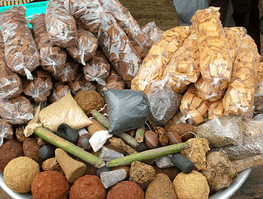The story of Enoch Keitu: Reflection of African art, culture and heritage
 The decision by the African Union to make art, culture and heritage the focus of this year’s Africa Day should be welcomed across all quarters.
The decision by the African Union to make art, culture and heritage the focus of this year’s Africa Day should be welcomed across all quarters.
It has been demonstrated in recent times that a lot of success can be achieved in Africa by advancing art, culture and heritage and packaging them suitably for wider consumption.
I will explain through examples.
Enoch Keitu is a young Ghanaian who has made significant strides with herbal medicine. His story is inspiring. He produces and sells scientifically standardised and certified herbal drugs through his stores, which keep gaining popularity. He also runs two herbal clinics that employ 13 people.
Keitu’s success lies in creative packaging of traditional knowledge, making his herbal drugs and treatment methods popular across the nation.
Having been exposed to traditional medicine at a tender age, Keitu had decided to go a step further to tackle the challenge of a general lack of quality, scientifically confirmed herbal medicine in Ghana, and absence of such documentation. He had realised that a majority of traditional herbalists, for lack of formal ways of documenting their trade, would exit the mortal world with their deep knowledge.
Keitu had therefore researched herbal medicine formulations and had studied the science at the Kwame Nkrumah University of Science and Technology. Subsequently, he obtained a Bachelor of Science degree in Herbal Medicine.
Keitu had started manufacturing herbal medicines after graduation. After a bit of a winding journey, he has eventually received funding from the Government of Ghana through the National Entrepreneurship and Innovation Programme (NEIP) to enable him together with a herbalist friend he had teamed up with, to set up a modern drug production facility and get certified by the Food and Drugs Authority (FDA) of Ghana. He also won a grant through the Youth Innovation for Sustainable development challenge supported by UNDP and the National Youth Authority that helped to purchase equipment.
The rest, as they say, is history. Today, Keitu and his partner run Kenoch HG Herbal Clinic Limited, which sells and supplies herbal medicine across Ghana, including in government health facilities. That the company runs two clinics already, in a span of only two years, is impressive.
The two herbalists are now eyeing the rest of the continent, hoping to benefit from the African Continental Free Trade Area (AfCFTA). This dream will no doubt require the involvement of more partnerships, including from the private sector, for the duo to elevate their production and distribution capacities.
Two things stand out that have made their success in Ghana possible.
One is government support, not only in terms of funding their initiative, but also in the fact that the country has formally integrated traditional medicine into its healthcare system, to the extent of also offering degree courses.
The other one is acceptance by the general population. About 70 percent of patients in Ghana opt for herbal medicines because they are more affordable as well as culturally and spiritually accepted.
Beyond Ghana, similar factors are important if African countries are to make good headway in using art, culture and heritage in socio-economically productive ways.
Keitu’s story is only a portion of the ingredients in the boiling continental cauldron of cultural initiatives going on in different parts and making an impact, and could do even better with widespread support.
Entertainment, for example, has shown big promise. In a recent report, PricewaterhouseCoopers (PwC) has indicated that “the music and entertainment industry in African countries like Nigeria is expected to continue to expand by 2022 with a projected 21.5 percent growth rate, and revenue reaching $9.9 billion.”
This is big, and it is thanks to creativity of a number of personalities who have made good application of African heritages in the entertainment industry.
Events that champion ‘Africanness’ in entertainment, such as the Born in Africa Festival, which brings onto one big platform, African film, fashion, music and art, deserve deeper and wider support. It, together with other events of similar kind, such as Ghana’s Year of Return or Panafest, are valid avenues for promoting sustainable profitable use of the vast talent resident in the continent. As we all know, the entertainment industry in America, which basically reflects their lifestyle, is massive. Why not Africa?
The good thing is that the continent is not just awakening in this respect, but also finding ways to make it big.
Africa’s entertainment ‘pupa’ is bursting open, and what is coming out of it is a beautiful butterfly coloured in African traditional artistry, knowledge and talent. It is indeed flapping away attractively.
Those of us who are in public and private spaces that are capacitated to keep this butterfly dancing and floating, must act together. Time is now.
COVID-19 may have given us a near-knock-out punch in the art, culture and entertainment industry, but we can recover faster together. We must make big use of the social and economic opportunities that our unique traditional cultural expressions present us with.
By Angela Lusigi
Email: [email protected]
Author is the Resident Representative of the UNDP in Ghana.
